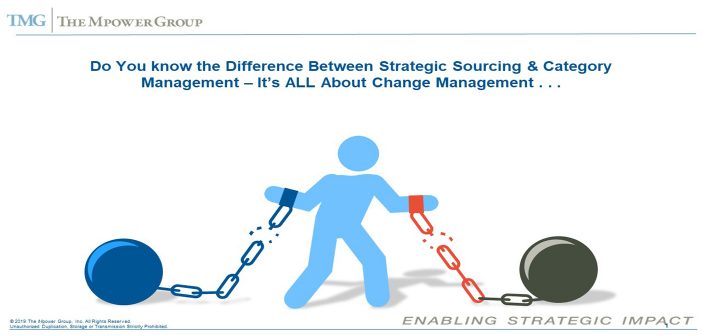. . . Still! We have several clients that are going through Procurement technology upgrades. The single biggest issue that they are ALL having is around the people side of the change which is ALL about Change Management. They are frustrated because most of the time they spent upfront, on planning for the transition, was spent on designing the system (features and function) and little time was spent on planning for how to get people comfortable with the change. The result is a system (very costly) that is significantly impacting productivity (even more cost), causing operational disruption and having a negative impact on adoption. Add to this mess, redesigning or outsourcing the underlying business processes that the system touches and you have a perfect storm for disaster. One client has a backlog of tens of thousands of supplier invoices that are way past due and a very unhappy supply base. These clients have all hired the mega consultants (the Big 4 and the like) who brought in dozens of resources to implement the system but included only a few to focus on Change Management. I totally understand the frustration.
Similarly, most of the issues we all experience in Strategic Souring and even more in Category Management are as follows:

If the above are the biggest issues, then here are a few key questions to consider:
- Why do we spend so much time training our people on the functional skills like the “7 step” process, negotiations, contracting, writing a good RFP?
- Why do we call the primary skill (Change Management) that will help us be successful a “soft” skill?
- Why do many leaders believe that you can’t “teach” the “soft” skills?
- Why don’t we look at our greatest challenges (internal / people related) and ensure that our people have the skills to meet those challenges?
First, can we please STOP calling Change Management a “soft” skill? There is nothing “soft” about it because managing change is HARD! We consider Change Management to be “strategic” competency and it can be taught! Like most strategic competencies (Consulting & Facilitation, Communication, Collaboration, etc.) there is an art and science to support it. For Change Management, there is a discipled process – the science (BTW all Change Management processes are basically the same) and there are the personal characteristics you need to hone to successfully execute the process – the art. I recently read an article entitled “Why Most Leadership Skills are Learned” which I found fascinating. The article points out that strategic skills like Change Management can be taught. The science part can be taught and practiced in the classroom and the art can be taught through experiential learning (providing employees the opportunity to use the skills / process), shadowing and observing leaders that display a high level of competency in the skill and mentoring those who are trying to develop the skill. Using this approach, you CAN teach strategic competencies.
I personally believe that Change Management is THE strategic competency most required of Strategic Sourcing and Category Management professionals. If we cannot get through the internal challenges we all face (mostly people related) then the best process in the world will not be successful. Change is HARD and most consultants do not emphasize the pain or importance enough. Having done Category Management as a CPO, I know that working with suppliers was by far the easy part. My entire day was spent selling the Value and capability of my team and understanding the Value Drivers of my internal Business Unit partners in order to break through the VERY REAL resistance we felt every day.
Our role as Procurement / Sourcing / Category Management professionals is that of a Change Agent. We need to play a leadership role in change and our people need to have the competency to play that role. If your organization needs help in this area – give us a call. We have been preaching this for over 20 years and it is as important today as ever.
Let us know what you think and join in the conversation . . . . .

